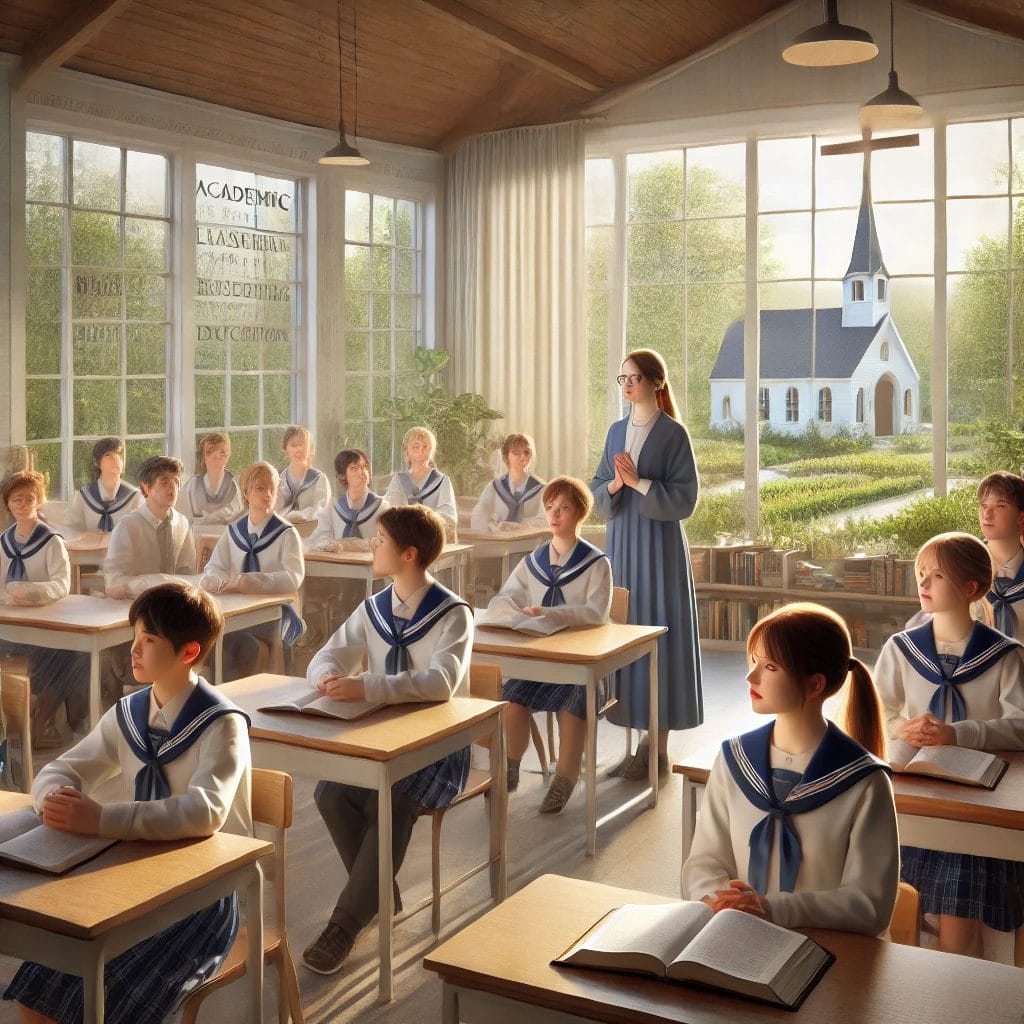Private schools focus on helping students grow in all areas by offering smaller classes, personalized teaching, and values-based lessons. Many also include faith-based learning to build strong morals and character while focusing on academics. These schools provide supportive spaces that help students become leaders, get ready for college, and succeed in life.
What Private School Education Really Means
What makes private school education stand out?
It’s not just about academics—it’s about shaping well-rounded kids through personal learning, strong values, and building good character.
Private schools have the flexibility to create customized curriculums that push and inspire students.
This gives kids an education that’s both challenging and meaningful.
In some faith-based private schools, religion can play a key role.
These schools often blend academic excellence with moral lessons to encourage personal growth, helping kids become thoughtful individuals who contribute positively to their communities.
With small class sizes, teachers can connect better with each student, adjusting lessons to fit how each child learns best.
This mix of care for both heart and mind showcases the value of private schooling.
Kids thrive in supportive environments where they learn to think critically and solve problems, preparing them for life beyond school.
By focusing on the whole person, private schools help students build both skills and strong values so they can reach their full potential.
Why Private Schools Stand Out Academically

Private school education is known for its focus on academic success.
One key reason is smaller class sizes, which allow for more personalized teaching.
Teachers can adjust lessons to fit each student’s needs, making sure no one is left behind and every child’s potential is nurtured.
This approach is great for families looking for a hands-on and tailored education.
Many private schools use specialized curriculums designed to inspire students and push them beyond standard learning.
These programs focus on advanced concepts, critical thinking, and creative teaching techniques that move past simple memorization.
With an emphasis on values like character and ethics, private institutions help students see learning as more than just schoolwork—it’s about discovery and personal growth.
With extra resources for building strong teacher-student connections, private school education offers both tough academics and emotional support.
This balance helps students achieve academic excellence and gain real-life skills they’ll need later.
Whether they focus on STEM, explore the arts, or build leadership skills, private school students are set up to face challenges with confidence.
Clickmill is here to help you reach families ready to invest in a future of success and learning.
Benefits Beyond Academics
Private school education offers more than just books and tests—it helps students grow in ways that shape their whole lives.
Activities outside the classroom, like debate teams, theater clubs, and sports, teach teamwork, discipline, and leadership.
These skills stay with students far beyond their school years.
Many schools that focus on academic excellence also blend academics with real-world projects to help students build communication and teamwork skills.
These hands-on experiences teach them how to tackle challenges, work with others, and uncover their unique strengths.
Schools often implement programs that inspire kindness and leadership, turning students into advocates for positive change.
Being part of a community adds even more value.
Through volunteering and group projects, students learn the joy of helping others and build strong connections with peers and mentors.
A private school education provides these experiences, laying the groundwork for personal growth and creating well-rounded individuals ready to lead and inspire wherever life takes them.
Comparing Public and Private School Education
When comparing public and private schools, the main differences often come down to academics and resources.
Public schools, run by government rules, follow standard curriculums meant to meet broad goals. This can make it harder to address individual needs or offer advanced learning options.
Private school education, on the other hand, doesn’t rely on government funding.
Schools in this category can create unique curriculums designed to challenge students and spark their curiosity.
Many private schools also focus on teaching values, blending lessons on ethics and character into daily learning.
For families who want education aligned with their beliefs or faith, this can be a big draw.
Resources make a big difference too.
Private schools often have smaller classes, so teachers can give more one-on-one attention.
This helps build strong teacher-student bonds and supports different learning styles.
Public schools, while open to everyone, may face challenges like large class sizes and tight budgets, which can limit new programs.
In the end, families who choose private school education often value well-rounded growth—academic success paired with moral development.
Private schools aim to sharpen minds while building strong character and leadership skills.
For these families, it’s not just about schoolwork—it’s about setting a foundation for life.
How Community Shapes Private School Life
Community is at the heart of private school education.
These small, close-knit spaces help students, parents, and teachers form strong bonds, creating a support system that boosts both learning and personal growth.
It’s a place where everyone knows your name and works together to help you succeed.
Private schools also promote close parent-teacher teamwork.
Parents and teachers stay in regular touch through chats, meetings, and school events, making parents active partners in their child’s education.
This partnership ensures any issues—whether academic, social, or emotional—are handled quickly and with care.
Student connections are just as important.
Smaller class sizes let peers work closely together in school and during extracurricular activities.
These shared experiences build lasting friendships and teach key life skills like teamwork, empathy, and clear communication.
In the end, the focus on community in private school education goes beyond just academics.
It fosters personal growth, academic excellence, and life skills.
For families seeking a well-rounded, community-driven education, private schools provide a unique and supportive environment.
Faith-Based Private School Education

Faith-based schools combine learning and faith, giving students a place to grow both academically and spiritually.
These institutions focus on a values-centered curriculum that incorporates spiritual principles into daily classes.
From classroom discussions to chapel services and service projects, faith becomes a natural part of the learning journey.
For parents seeking the benefits of private school education, these schools emphasize more than just good grades—they also instill values like kindness, honesty, and humility.
Students learn how to make choices based on these principles, preparing them for life.
Activities like helping in the community and service projects allow students to apply these values, fostering empathy and a sense of purpose.
Such schools often cultivate a strong sense of community where students and families share similar beliefs and support one another.
This close-knit bond fosters collaboration and encouragement, helping students feel they belong.
By balancing scholarship with personal growth and character development, faith-based private schools prepare students to excel in life with strength and a solid foundation of values.
Faith, values, and learning – the cornerstone of academic excellence.
Preparing for College and Beyond
Private school education helps students get ready for college and life by offering programs that fit their goals and teach skills they’ll use as adults.
These schools provide tailored support that matches each student’s needs.
From guidance counselors who assist with college applications to advanced classes like AP courses or dual enrollment, students are equipped with tools to help them thrive.
Private school education emphasizes critical thinking and problem-solving.
Their classes encourage students to think deeply, approach problems creatively, and stay curious—skills that are invaluable in daily life.
Whether it’s participating in debate teams, tackling STEM projects, or engaging in writing-focused courses, students gain confidence for the challenges of college.
Soft skills are another key focus.
Leadership opportunities in clubs and small class environments help students develop communication, time management, and teamwork skills.
These abilities serve them well not only during college but in life and future careers.
By cultivating academic excellence, strong values, and practical skills, private schools prepare students for success in an ever-evolving world.
How Private Schools Help Students Succeed with Innovation

Private schools today are using new ideas to help students get ready for a future filled with chances and challenges.
Modern spaces like high-tech labs, flexible classrooms, and group work areas are at the center of this approach.
These spaces spark creativity and let students explore what they love in hands-on ways.
Whether it’s in advanced STEM labs or art studios full of possibilities, students thrive when they learn in spaces built for active learning.
Technology is just as important in shaping private school education.
From smartboards to personal devices, teachers use tech every day to make lessons clear and exciting.
For example, science classes use digital simulations to explain tough ideas, and online tools help students work together and solve problems as a team.
By mixing old-school teaching with new tools, students not only learn facts but also gain the skills to use them in the real world.
With access to modern tools and smart tech, private schools foster academic excellence and encourage students to think critically and keep growing throughout their lives.
These resources and spaces work together to create an inspiring learning experience—one that prepares students to lead, create, and make a difference in today’s connected world.
Finding the Right Private School
Choosing the right private school for your child can feel like a lot, but breaking it into steps can help.
Start by making a list of what matters most to you.
Think about things like academics, values, and activities.
Does the school mix strong academics with moral or spiritual growth?
Do they have small class sizes so teachers can focus on each child’s needs?
When you visit schools, pay attention to how the place feels.
Is it welcoming?
Do teachers and students seem to have good relationships?
Look at the classrooms, how the school uses technology, and how the community interacts.
Also, use the admissions process to ask important questions.
What is the school’s mission, and how does it guide daily life? How does the school support students striving for academic excellence?
Talking directly with teachers and staff will give you a better feel for the school than any website or brochure.
In the end, private school education offers a chance for your child to succeed in learning, grow in values, and build the skills they need to lead and thrive.
Private School Education Around the World

Private schools vary greatly around the globe, shaped by local culture, academics, and values.
However, they share a common commitment to fostering academic excellence and personal growth.
Many institutions offer advanced programs like the International Baccalaureate (IB) or bilingual education, preparing students for future success in college and their careers.
In certain countries, private schools excel by incorporating creative teaching methods and modern technology.
For instance, schools in Singapore and Finland integrate cutting-edge tools into lessons while teaching students critical thinking and ethics.
In the U.S., faith-based schools blend rigorous academics with moral instruction, helping shape future community leaders.
International private schools also provide an opportunity for students to interact with peers from diverse backgrounds.
This global exposure fosters cultural understanding and adaptability.
By exploring various private school systems, parents can make informed choices and select the ideal private school education for their family.
For families seeking guidance, expert advice from Clickmill can be an essential resource in making this pivotal decision.
Private School Funding and Financial Aid Options
Choosing the right private school shouldn’t feel impossible because of money worries.
Many institutions offering Private School Education provide tuition payment plans to help make costs more manageable.
These plans often let families pay in smaller, spread-out payments, making it easier to afford without losing the high-quality education offered.
Schools focused on academic excellence also know the importance of inclusivity and provide financial aid programs to support families.
Common options include need-based aid and merit scholarships.
Need-based aid evaluates a family’s financial situation to ensure students from all backgrounds can access top-notch learning opportunities.
Merit scholarships reward students for their academic or extracurricular talent, helping well-rounded kids thrive in a unique school setting.
Some institutions also collaborate with outside organizations to provide extra funding options.
These programs may include grants or endowments to further minimize financial obstacles.
Families should connect with the admissions office of the school they’re considering to explore what funding options are available, as each school handles this differently.
Bottom line: Private schools aim to make education about learning, growth, and opportunity—not just a privilege, but a realistic achievement.
Meeting Each Student’s Needs
Private school education excels at shaping learning to fit each student’s unique requirements.
Smaller class sizes allow teachers to give more one-on-one attention, creating a personalized experience that can make a significant impact.
Whether a student needs greater challenges or extra assistance, private schools adapt their teaching methods effectively.
Many of these schools also employ modern tools, such as adaptive learning software, to cater to different learning speeds and styles.
This approach ensures students stay engaged and challenged, avoiding both boredom and the risk of falling behind.
With fewer students per teacher, educators can develop strong relationships and gain deeper insights into each child’s strengths, challenges, and interests.
For students with learning differences, private schools often provide customized programs and access to experienced educators.
These resources foster strategies that support academic growth while building self-confidence.
The goal is clear: to help every student thrive in a nurturing environment—an integral feature of private school education.
Why Ethics and Character Education Matter

Private school education offers more than just academics—they shape who students are and guide them toward a life built on honesty and purpose.
Many private schools integrate core values with challenging coursework, creating a balance that teaches respect, responsibility, and empathy.
By including ethical lessons in everyday learning, these schools help students handle challenges with both wisdom and kindness.
Through class discussions and service projects, students grow a sense of accountability that reaches far beyond the classroom.
Teachers lead by example, showing what integrity looks like and highlighting how to make ethical choices in studies and in life.
Small class sizes make a big difference.
They give teachers the chance to mentor students closely, helping them grow not just academically, but morally.
Students learn the value of honesty, effort, and respect for others—skills that help them become thoughtful leaders and citizens.
In a world full of challenges, lessons in character help students build resilience and a strong moral foundation.
These values guide them to create positive change, wherever their paths take them.
Private school education focuses on building futures filled with purpose and academic excellence.
Ready to explore the transformative power of Christian Private School Education? Book a call today and discover how a faith-based approach can nurture academic excellence and cultivate a lifelong love of learning.
FAQs
Private school education often features smaller class sizes, specialized curriculums, and may incorporate values or faith-based learning (in religious schools) to support character and ethical development.
Yes, some private schools provide financial aid or scholarships. The availability and details vary by school, so families are encouraged to inquire directly with the institution.
Private school education emphasizes personalized learning through smaller class sizes and rigorous curriculums designed to strengthen critical thinking and problem-solving abilities.
Private schools often offer resources and tailored attention to address diverse learning styles, enabling students with special needs to succeed.
In faith-based schools, religious values are integrated with academics, emphasizing lessons in character development, ethics, and respect.

Responses